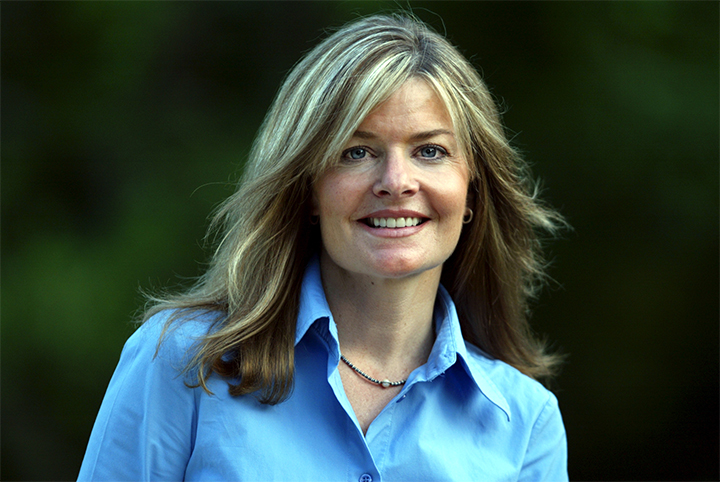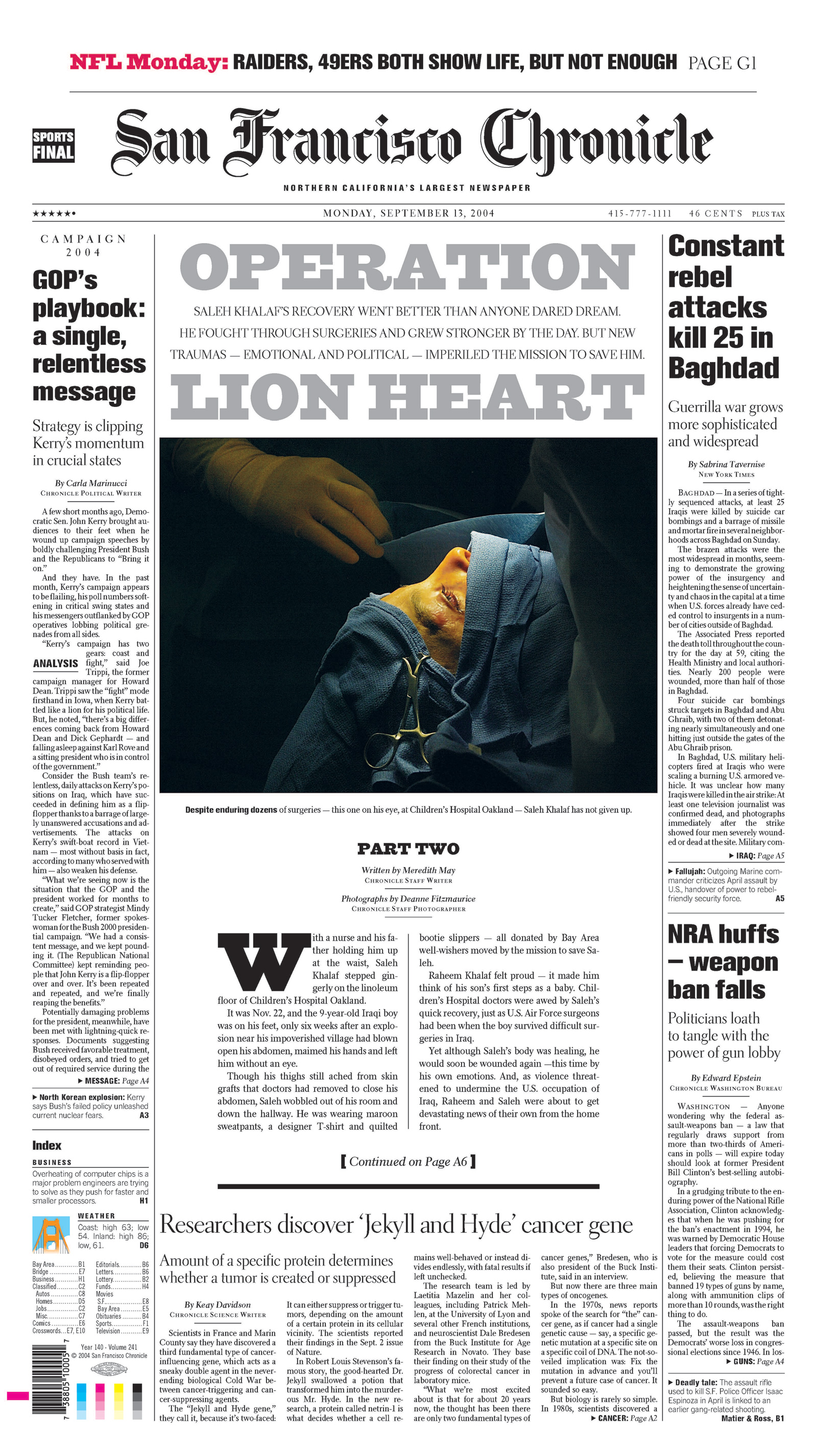
Chronicle photographer honored for sensitive work on ‘Lion Heart’ series
Kevin Fagan
San Francisco Chronicle Staff Writer
April 5, 2005
Chronicle photographer Deanne Fitzmaurice won the Pulitzer Prize in feature photography Monday for her photo essay last year portraying the efforts by doctors to mend the wounds of a 9-year-old Iraqi boy who was nearly killed by an explosion, and the boy’s courageous struggle to rise above his injuries.
Fitzmaurice’s pictures ran with five stories reported by Chronicle staff writer Meredith May, headlined “Operation Lion Heart” after the nickname that doctors gave the boy, Saleh Khalaf, for his bravery.
“Can you believe this?” a beaming Fitzmaurice, 47, said as the award announcement rolled over the newsroom’s wire service and The Chronicle news staff burst into cheers.
The prize, the most prestigious in American journalism, comes with a $10, 000 check.
Fitzmaurice has worked at The Chronicle for 16 years. Hers is the first Pulitzer won by The Chronicle since 1996, when Herb Caen, who died the next year, won a special Pulitzer award for his career as a columnist.
Fitzmaurice and May first began reporting on Saleh and his family on Nov. 10, 2003, within hours of the boy’s arrival with his father, Raheem, at Children’s Hospital Oakland for treatment of his injuries. Over the next 11 months, they followed the family’s plight in every way, documenting the key points of Saleh’s recovery, traveling to the Middle East to accompany his relatives as they journeyed to join Saleh, and then recording the family’s tearful reunion in America.
Fitzmaurice’s images — described as a “sensitive photo essay” by the Pulitzer judges — offered an unflinching view into the anger, grief and courage of the boy’s family, taking the reader from intimate and painful portrayals of Saleh’s injuries to the family’s joy at each success in his treatment.
“It really required a unique combination of sensitivity and courage for Deanne and Meredith to capture so beautifully and evocatively the story of Saleh,” said Chronicle Editor Phil Bronstein.
Also winning Pulitzers on Monday were Sacramento Bee writer Tom Philp, for his editorials about restoration of Hetch Hetchy Valley, and the Associated Press for breaking news photography of combat inside Iraqi cities.
The Los Angeles Times won two Pulitzers, the public service gold medal for exposing racism and deadly medical troubles at a public hospital, and an international reporting prize for coverage of Russia. The Wall Street Journal also won two Pulitzers, one in beat reporting for stories about cancer survivors and the other in criticism for film reviews. And the tiny Willamette Week of Portland, Ore., grabbed the investigative reporting prize for exposing an ex-governor’s sexual misconduct.
Fitzmaurice said she could never have completed the story without the help of her editors on the project and, especially, Saleh’s family.
“This project was just unbelievable,” Fitzmaurice said. “It was more in depth than anything else I’ve done, and a lot of the reason for that was just the way Saleh was. He was so courageous, and he let us so into their lives.”
As her beaming colleagues crowded around her at the newsroom photo editing desk and champagne corks popped, the grinning photographer proclaimed: “This is not just for me; this is a Pulitzer for the entire Chronicle.”
That Fitzmaurice could gain the trust of a boy who was traumatized by the loss of an eye, one hand and his brother to a roadside bomb near his home in Iraq was no surprise to Chronicle staffers who have long appreciated her sensitive ability to connect with those she photographs by truly caring about them. Throughout the years as she documented everything from the private life of former Giants manager Dusty Baker to the inside of brothels in Nevada, she has always treated people as fellow human beings with feelings instead of mere subjects — all the while capturing images with an uncommonly precise and artful eye.
 “We were in the family’s life for a year, and she always put her humanity first,” said May. “I think she fell in love with that little boy, and put him first before any photography. And it showed in the photographs.”
“We were in the family’s life for a year, and she always put her humanity first,” said May. “I think she fell in love with that little boy, and put him first before any photography. And it showed in the photographs.”
Fitzmaurice said Saleh’s buoyant spirit helped drive her along in her project, even when his sadness and pain seemed nearly unbearable.
“Saleh could always laugh, even though he only spoke Arabic at first,” she said. “We bonded through the photography. I’d shoot pictures, then show him some on the back of the camera, and he’d get so excited.”
Fitzmaurice’s husband, Kurt Rogers — also a photographer at The Chronicle — joked that he had a good feeling about his wife’s chances Monday after shooting a picture of her Sunday in their backyard in Marin County. In the photo, Fitzmaurice is smiling beneath the only double rainbow the couple had ever seen at their home.
Fitzmaurice’s award was the sixth Pulitzer won at The Chronicle, beginning with the 1934 Pulitzer for reporting awarded to staff writer Royce Brier for his coverage of a lynching in San Jose.
She now becomes the third photographer on The Chronicle’s staff who has won a Pulitzer. The others are Kim Komenich, who won in 1987 while working at the San Francisco Examiner for his coverage of the fall of Philippine President Ferdinand Marcos, and Michael Macor, who was on the Oakland Tribune team that won in 1990 for coverage of the Loma Prieta earthquake.
Also nominated in the feature photography category with Fitzmaurice this year were Jim Gehrz of the Star Tribune in Minneapolis-St. Paul, for his portrait of a female soldier’s recovery from battle wounds, and Luis Sinco of the Los Angeles Times for his photo of a weary U.S. Marine’s face after a day of fighting, a cigarette dangling from his mouth.
A gallery of Deanne Fitzmaurice’s Pulitzer Prize-winning work can be seen at www.sfgate.com/cgi-bin/article.cgi?f=/g/a/2005/04/04/pulitzergallery.DTL
